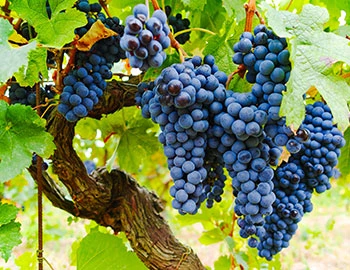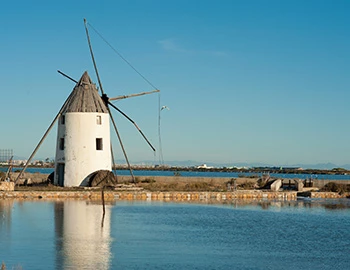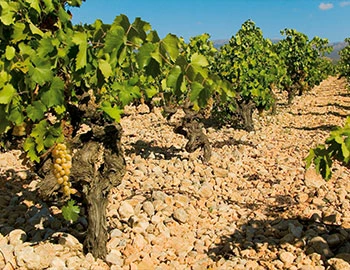
Five Miles 2018
Vino Varietal Yecla, Atlan & Artisan, 750 ml

| Grape variety: | Monastrell, Garnacha Tintorera |
| Producer: | Atlan & Artisan |
| Origin: | Spain / Murcia / Yecla |
Description
Five Miles is a favourite for lovers of opulent wines. This red wine delights with its rich bouquet of stewed plums, juniper and rose petals. It is powerful and juicy on the palate, with plenty of fruit extract and exciting flavour. Our tip: decant before drinking.
Our head sommelier Marc Almert about the Five Miles
Guests often ask me for a dark, intense and opulent red wine that can hold its own even with braised dishes or stews. One of my favourite varieties of grape to meet this requirement is Mourvèdre, known in Spain as Monastrell. This variety is the star of the show in Five Miles from Yecla (not far from Alicante) and is ably supported by the Garnacha Tintorera grape. In this warm part of the world, the altitude of 800 m is crucial, as it allows the wine to grace the palate with a freshness and pleasant tartness in spite of its explosive, almost jammy fruitiness and slightly elevated alcohol content. A warming wine for cold winter evenings in front of an open fire.
Five Miles – weshalb heisst der so?
Marc Almert und Antonio Metz kosten für Sie den Five Miles von Atlan & Artisan und beantworten die Frage, weshalb dieser spanische Rotwein einen solch ungewöhnlichen Namen trägt.
Attributes
| Origin: | Spain / Murcia / Yecla |
| Grape variety: | Monastrell, Garnacha Tintorera |
| Ripening potential: | 2 to 10 years |
| Drinking temperature: | 16 to 18 °C |
| Food Pairing: | Wild fowl, Wild specialities, Beef Stroganoff, Latin American dishes, Hot vegetable curries |
| Vinification: | fermentation at low temperatures, fermentation in steel tank, biological acid degradation in barrel |
| Harvest: | hand-picking, in small boxes |
| Maturation: | in large wooden barrel/foudre, in used barriques |
| Bottling: | by hand, no filtration |
| Maturation duration: | 27 months |
| Volume: | 15.5 % |
| Note: | Contains sulphites |
Monastrell
Hot-blooded Spaniard
It cannot be hot enough for the Monastrell grape. It grows around the Mediterranean, where the summers are long and hot and the winters mild. At only 200 metres in elevation, or 80 kilometres from the coast, its grapes have problems ripening. It was likely born in the Valencia region. According to written records, it was already counted among the most important varieties in 1460. Its exact origin is thought to be the Camp de Morvedre area. From there, it migrated in the 17th century to Provence, where it was christened Mourvèdre. Its wines are deeply dark, with intense blackberry aromas, rich tannins and moderate acidity. They enter into the most beautiful harmonies with other varieties from the south, such as Garnacha, Carignan or Syrah. The Mourvèdre is the main ingredient of red wines of Bandol; it also flows into the Châteauneuf-du-Pape. On the Spanish Levante coast, it is also pressed solo.

Murcia
Murcia: Home to the Monastrell variety
The city of Murcia is scarcely known outside of Spain; however, with nearly 500,000 inhabitants, it is the powerful center of a rural region. Fruit, vegetable and wine cultivation are still important economic factors here. In the three wine-growing areas located in the autonomous region of Murcia – Bullas, Jumilla and Yecla – the Monastrell variety demonstrates that it can produce wines of varying character.

Spain
Spain – Variety and perfection
“Somewhere in la Mancha, in a place whose name I do not care to remember...,” begins Don Quixote's odyssey.
The most famous part is definitely when Don Quixote thinks windmills are his enemy and wants to fight them – until they nearly kill him. It’s possible there was a bit too much of the La Mancha wine at play. Spanish vines fight for their survival in rugged landscapes, battling fierce drought and rough soils. But they fight well.


